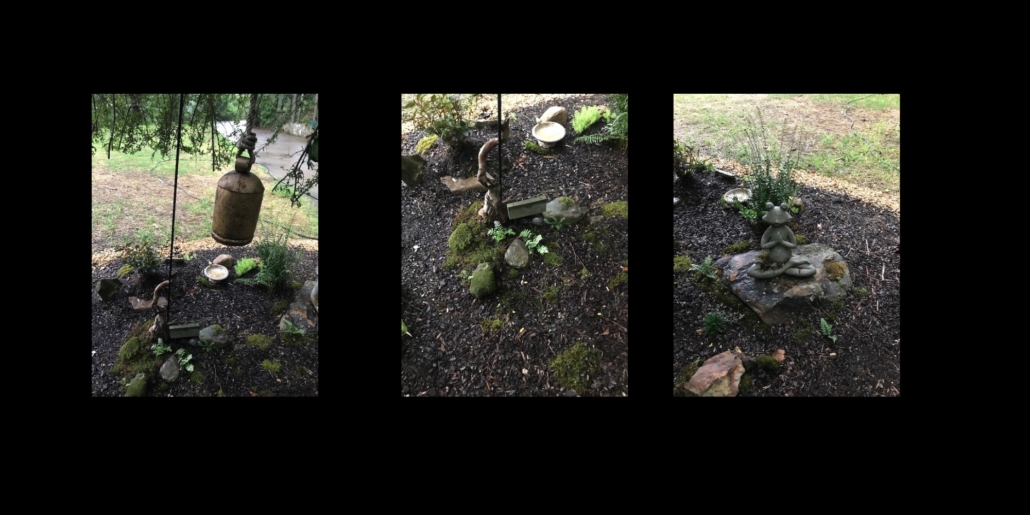The last few weeks (during the heat spell, of course), I’ve spent on my knees with copious streams of perspiration running down my face (or as the Southern phrase goes, “sweating like a stuck pig”).
A few years ago, I was working full time and squeezing every minute of free time available into writing. The yard rarely got attention. Over the years, I planted a few things next to the house and basically let ground covers fill in.
Then I retired. My goal and dream was to write. But Covid hit. I was afraid of the groceries. I didn’t know who of my loved ones would die, how many would fall, or if I would die. I couldn’t write.
At some point, I looked out the back window and realized that the small piece of wisteria root I had thrown into the woods thirty years prior had not only taken over the woods but had taken down large trees and eaten half of the backyard! Apparently, I had not ventured there for thirty years.
Unable to write and stressed out, I needed a purpose and distraction, so I learned what a mattock was and used hard labor to feel like I had a purpose. I dug up the long, stubborn roots spread all over the yard. It was the beginning of the months long Wisteria Wars . . . which is still ongoing, but is now skirmishes fought with spray. Like Kali, the Hindu goddess of Destruction, I hacked and chopped, hoping to be able to sleep at night.

One day, I noticed the green moss on the brick walkway in the front yard was full of little weeds and grass. Something else I never had time to notice. Moss is magic. When he was little, I took my stepson into the woods and explained that elves lived in the rotting hollow tree trunks and that the emerald splotches of moss in the woods were actually “elf carpet,” touching off his vivid imagination, which he still expresses in his art. When he eventually had children, he passed on the wonder of elf carpet.
Forgoing the fearsome Kali for Venus, (who was a goddess of the garden and cultivated fields before the Roman assignation as the Queen of Love), I spent several hours absorbed in the work/craft of pulling up tiny weeds from carpet without tearing it. A different kind of gardening than hacking wisteria roots, it offered a calmer sense of purpose and absorption.

A huge weeping yaupon arches over that walkway. (Although mine is higher than the house roof and trimmed to have a “tree” bark, a yaupon is technically a bush with small leaves containing caffeine that the Creek Indians used to make “Black Drink,” for social bonding rituals. Translate: having coffee with friends.) I love the “tree” (as do the birds—especially the waxwings—that descend on it on their way to wherever they are going and devour the berries it produces). But the shadow area it creates over the front yard has always been a scraggly place of weeds and dirt where grass refuses to grow.
I had the area scooped out in a waxing moon shape and re-dirted. (Writers can make up words, y’all; it’s in the writing rule book. You can look it up….) Then spent three days picking out embedded rocks. I considered many kinds of shade-loving plants, but discovered I really wanted a place for the elves. So, I went moss-fern-rock hunting in the nearby woods and raided the ditch next to our driveway that becomes a stream when it rains, careful to only take a part of the mound to allow it to grow back (a nod to First People wisdom).
My sister sent me a photo of a meditating frog statuette she found. (She knew frogs make me smile), and I had to have it. The elves would love it! The meditating frog has a home now, as does a huge bell and a dragon my husband gave me and other cherished things, including a piece of driftwood from the Gulf beach and three black stones from my husband’s beloved Big South Fork of the Cumberland River in Tennessee.


It’s just a beginning. It will take time and patience and lots of sweat, I know, but my garden gifts me with daily joy, and a big smile every time I pass my frog, even though he doesn’t smile back . . . being absorbed in seeking enlightenment.
The garden reminds that creation requires a balance of destruction and growth.
Destruction is only a changing of forms. The unwanted plants transform into soil, feeding a new generation of life.
The garden is a place of humility. When new life stirs the soil, it also stirs the realization that you are only the tender, that creation comes from the Universe itself and even as you affect it, it affects you.
The act and process of gardening is a metaphor for many things, as is writing. Words blossom. Some need pruning and some need to be pulled out altogether to make room for others that work better. But even that act of creation comes from somewhere that is more than the sum of parts, as any writer will acknowledge.
And often, if you put sweat (metaphorically or real) into it, both words and weeds can create something unique, something beautiful, and maybe even inspiring.

T.K.Thorne is a retired police captain who writes Books, which, like this blog, go wherever her curiosity and imagination take her.

What a fabulous workout for mind and body! The gift of your garden is creation and reflection! Loved the short journey this morning- I was “rooted” to my chair. TK so grateful for your imagination and ability to write, paint and garden!!!
You always enlighten and inspire. Thank you.
This is priceless!
Sent from Mailhttps://go.microsoft.com/fwlink/?LinkId=550986 for Windows
Thank you, Laura!
Thank you much, Linda.
Thank you. Grateful for you!
Always, happy to have you on my journeys, my friend! 🙂